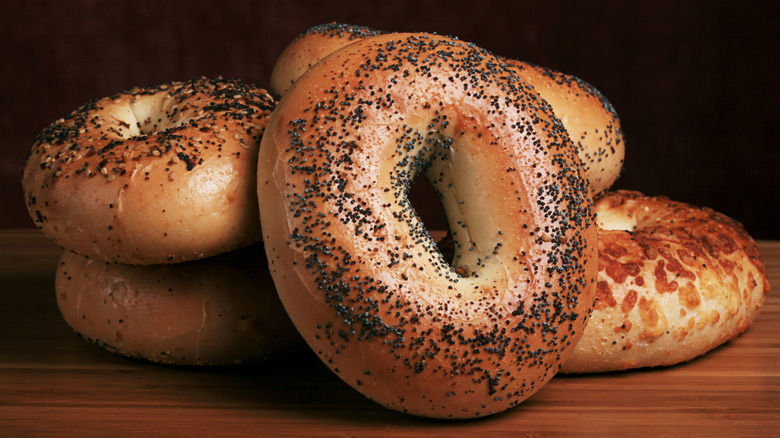How Bagels Became A Beloved Post-Fast Meal For Yom Kippur
Yom Kippur, the holiest day on the Jewish calendar, features a day of repentance and atonement that includes a 25-hour fast period during which neither food nor drink are consumed. When it comes time to break the holiday fast, one of the mainstay items eaten by American Jews is the bagel, often accompanied by lox and a schmear of cream cheese or other various toppings or spreads. Bagels help replace precious carbs lost from the fast and it provides a great way to safely ease back into sensible eating without overdoing it with a huge meal.
While traditional foods to break the Yom Kippur fast can vary depending on the country and culture, in the U.S. the bagel became a beloved post-fast meal. Part of its appeal had to do with its practicality — Jews are prohibited from preparing or cooking dishes on Yom Kippur so a bagel with a spread offers a quick and convenient means of sustenance. But, that's not the only significance behind bagels being a popular part of a meal to break the Yom Kippur fast in America.
Bagels' Jewish origin
In addition to its allure as a comfort food that can swiftly fill a hungry void, bagels are also a Jewish food, with different stories circulating as to their historical origin. One less credible claim attributes their invention to a 17th-century Jewish baker from Vienna, Austria, while the other cites documentation from Krakow, Poland, in the early 1600s, claiming they were gifted to women post-childbirth. In fact, the first usage of the Yiddish word bagel dates to 1610 in Krakow. It is also believed that a precursor product resembling a bagel called an obwarzanek was eaten in Poland as far back as the late 14th century.
Whatever the truth behind their creation, what is clear is that Eastern European Jewish immigrants brought bagels with them to the U.S. in the late 19th and early 20th century. For a while, bagels remained under the radar in popular food culture but eventually became synonymous with New York and ultimately their commercialization as a breakfast staple took off in the 1960s with the advent of frozen bagels. Today, Jewish people, especially in New York but also throughout America, enjoy bagels after the Yom Kippur fast as a traditional favorite and a nod to their cultural roots.

